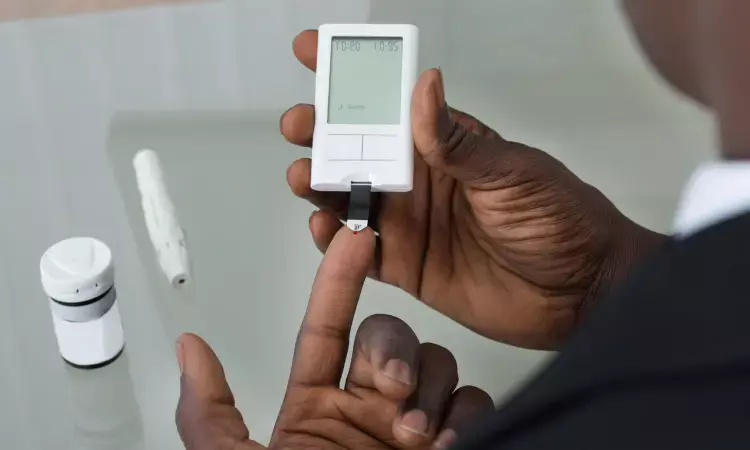- Home
- Medical news & Guidelines
- Anesthesiology
- Cardiology and CTVS
- Critical Care
- Dentistry
- Dermatology
- Diabetes and Endocrinology
- ENT
- Gastroenterology
- Medicine
- Nephrology
- Neurology
- Obstretics-Gynaecology
- Oncology
- Ophthalmology
- Orthopaedics
- Pediatrics-Neonatology
- Psychiatry
- Pulmonology
- Radiology
- Surgery
- Urology
- Laboratory Medicine
- Diet
- Nursing
- Paramedical
- Physiotherapy
- Health news
- Fact Check
- Bone Health Fact Check
- Brain Health Fact Check
- Cancer Related Fact Check
- Child Care Fact Check
- Dental and oral health fact check
- Diabetes and metabolic health fact check
- Diet and Nutrition Fact Check
- Eye and ENT Care Fact Check
- Fitness fact check
- Gut health fact check
- Heart health fact check
- Kidney health fact check
- Medical education fact check
- Men's health fact check
- Respiratory fact check
- Skin and hair care fact check
- Vaccine and Immunization fact check
- Women's health fact check
- AYUSH
- State News
- Andaman and Nicobar Islands
- Andhra Pradesh
- Arunachal Pradesh
- Assam
- Bihar
- Chandigarh
- Chattisgarh
- Dadra and Nagar Haveli
- Daman and Diu
- Delhi
- Goa
- Gujarat
- Haryana
- Himachal Pradesh
- Jammu & Kashmir
- Jharkhand
- Karnataka
- Kerala
- Ladakh
- Lakshadweep
- Madhya Pradesh
- Maharashtra
- Manipur
- Meghalaya
- Mizoram
- Nagaland
- Odisha
- Puducherry
- Punjab
- Rajasthan
- Sikkim
- Tamil Nadu
- Telangana
- Tripura
- Uttar Pradesh
- Uttrakhand
- West Bengal
- Medical Education
- Industry
Uncontrolled blood sugar can significantly increase risk of jawbone necrosis after invasive dental interventions

A new study by Gabor Kammerhofer and team showed that ischemia is a consequence of high glucose levels and may be a risk factor for the development of necrosis. The findings of this study were published in the Journal of Clinical Medicine.
Medication-related osteonecrosis of the jaw (MRONJ) is a kind of jawbone necrosis induced by the use of cancer and osteoporosis medications. Bisphosphonates and Denosumab injection are the two primary components of antiresorptive treatment. By blocking the farnesyl pyrophosphate synthase enzyme, currently utilized aminobisphosphonates can be liberated from bone destroyed by osteoclasts and cause cellular death. The purpose of this study was to look at the links between hyperglycemia and the development of medication-related osteonecrosis of the jaw.
The study looked at data collected between January 1, 2019 and December 31, 2020. A total of 260 patients were chosen from Semmelweis University's Inpatient Care Unit, Department of Oromaxillofacial Surgery and Stomatology. The study made use of and included fasting glucose data.
The key findings of this study were:
1. Hyperglycemia was found in approximately 40% of the necrosis group and 21% of the control group.
2. Hyperglycemia and MRONJ had a significant correlation (p 0.05, p = 0.003).
3. Hyperglycemia-induced vascular abnormalities and immunological dysfunction can result in necrosis following tooth extraction.
4. The mandible (75.0%) and parenteral antiresorptive therapy (intravenous Zoledronate and subcutaneous Denosumab) are more prone to necrosis.
5. Hyperglycemia is a more significant risk factor than poor dental hygiene (26.7%).
The findings of this study reveal that the probability of developing MRONJ in patients with dysglycemia is statistically considerably higher than in those with normoglycemia. This study assesses the characteristics (e.g., age, gender, type of cancer, presence of osteoporosis) and behaviors (such as smoking and drinking alcohol) of patients, as well as the potential combined effects of dysglycemia and antiresorptive medication that may result in ischemia. Based on the findings, ischemia may be a risk factor for developing jawbone necrosis following invasive dental or oral surgical treatments, particularly in the lower jaw.
Reference:
Kammerhofer, G., Vegh, D., Bányai, D., Végh, Á., Joob-Fancsaly, A., Hermann, P., Geczi, Z., Hegedus, T., Somogyi, K. S., Bencze, B., Biczó, Z., Juhász, D. H., Zaborszky, P., Ujpál, M., Vaszilkó, M. T., & Németh, Z. (2023). Association between Hyperglycemia and Medication-Related Osteonecrosis of the Jaw (MRONJ). In Journal of Clinical Medicine (Vol. 12, Issue 8, p. 2976). MDPI AG. https://doi.org/10.3390/jcm12082976
Neuroscience Masters graduate
Jacinthlyn Sylvia, a Neuroscience Master's graduate from Chennai has worked extensively in deciphering the neurobiology of cognition and motor control in aging. She also has spread-out exposure to Neurosurgery from her Bachelor’s. She is currently involved in active Neuro-Oncology research. She is an upcoming neuroscientist with a fiery passion for writing. Her news cover at Medical Dialogues feature recent discoveries and updates from the healthcare and biomedical research fields. She can be reached at editorial@medicaldialogues.in
Dr Kamal Kant Kohli-MBBS, DTCD- a chest specialist with more than 30 years of practice and a flair for writing clinical articles, Dr Kamal Kant Kohli joined Medical Dialogues as a Chief Editor of Medical News. Besides writing articles, as an editor, he proofreads and verifies all the medical content published on Medical Dialogues including those coming from journals, studies,medical conferences,guidelines etc. Email: drkohli@medicaldialogues.in. Contact no. 011-43720751


